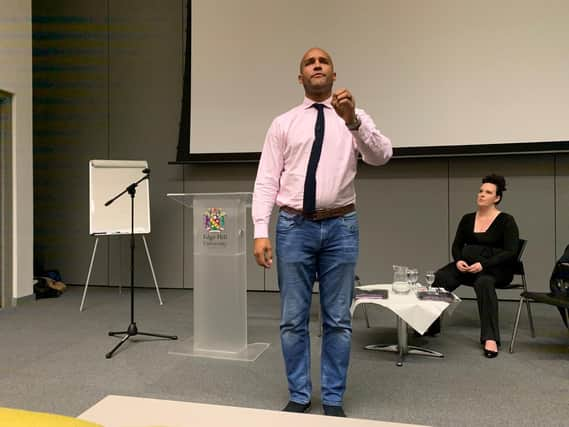Courageous former Clarets defender Clarke Carlisle praises Burnley FC's support for young players' mental health


The expectant father-of-four spoke to Edge Hill University to educate people on spotting the signs of ill-mental health both in themselves and others.
Giving an insight into mental health support in football and the mechanisms in place to support players, Clarke anecdotally drew on instances of ‘disaster recovery’ and called for more to be done from the beginning, much like Burnley FC’s academy.
Advertisement
Hide AdAdvertisement
Hide AdHe added: “They’re introducing a whole self-approach so that every individual that comes through their academy knows their value as a human being, not just as a potential footballer. And, bringing that in right through to the age of 21 is a fantastic start on this journey but there are others who don’t do it at all and that’s invariably because of the cost basis for it.
“There’s also a massive staff turnover, you’ve got a manager who wholly endorses this and then the next manager comes in and thinks it’s fickle and totally dismisses it so, until someone comes in and externally imposes a regime within the industry then it’s always going to be this bit-part approach but we always view sport as separate from society.
"Every sport is made up of your neighbours and mine, members of our community, and they reflect the knowledge and understanding of the general population so we’re all going on this journey together.”
In a whistle-stop tour of his career, from his first signing at Blackpool FC to playing in front of 90,000 people for England U21s with his mum, dad and grandad in tears in the stands, Clarke described the pivotal points that led to him being forced into retirement and left without an identity as he was no longer ‘Clarke Carlisle the footballer’.
Advertisement
Hide AdAdvertisement
Hide AdExplaining that it’s only harder for people in sport to come forward and talk about their mental health when it’s seen as a weakness, he said:
“We need to totally transform that perception about talking about your mental health. If people start to view talking about their mental health and the maintenance of it as personal development then no-one is reluctant to talk about it as it’s seen as upskilling, it’s seen as progress but, while we retrain the view that it’s a sign of vulnerability, that it’s a sign of perceived weakness then yes, people will be reticent to come forward in these elite alpha dog-eat-dog industries and sport.
“Anyone in a uniform almost adopts superhuman traits; police, fire etc, whoever the first responders were who went to the trailer and found nigh on 40 bodies. We just take it for granted that they go and do their job and find the culprits. That is going to traumatise people and we need to understand that no matter what industry you’re in, you go in as your work persona, and when you leave, you are a human being.”
Clarke asked the audience what they’d give to someone who had a cold, when talking about signposting to professional mental health services. He called on the those in the room to recognise early intervention, candidly likening a chat, hug and cup of tea as the mental health equivalent of a Lemsip.
Advertisement
Hide AdAdvertisement
Hide Ad“There’s a reason it doesn’t feel appropriate. You’re not supposed to diagnose people. It is appropriate however, for you to get help.”
Carrie was six-months pregnant in 2017 when Clarke travelled to Liverpool intent on ending his life for the fifth time. Although she knew his history and about the previous attempts, she explained how she didn’t see it coming, saying “I love my husband unconditionally but there’s a part of it I just don’t get.”
Since that time, the couple recalled, they had embarked on their road to recovery together and were now thriving, intent on changing how mental health is viewed and at what point people seek help.
She said: “83 men a week take their own lives. Where are the statistics about people like Clarke? Clarke went on a journey from actively suicidal to the most well he’s ever been in three weeks. These are the statistics we need.
Advertisement
Hide AdAdvertisement
Hide Ad“It is alright. We are proof it is alright. Go to your GP. No-one’s going to make you do anything but tell the truth.”
“So if you look first to Samaritans who have a free phoneline, free text line, to Mind, these guys will point you to the local services in your area who can be on call 24/7. If you’re unsure, go big, go national, because they will signpost you local and specific”
Samaritans can be contacted by calling 116 123 for free or for more information, visit www.samaritans.org
The mental health charity Mind can be contacted on 0300 123 3393 or you can text 86463. More information can be found at www.mind.org.uk